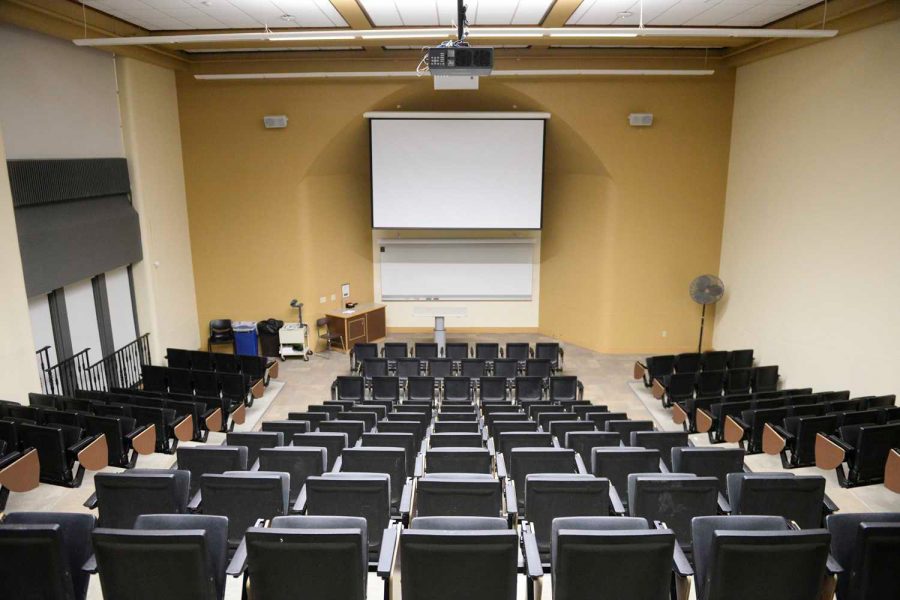No significant increase in course withdrawals following introduction of new accommodation policy
Pitt’s administration and Student Government Board have been working to change grading policies in order to represent the challenges students have faced during the COVID-19 pandemic and online learning.
March 3, 2021
With a variety of learning formats — from synchronous to asynchronous and online versus in person, Pitt students, like many students worldwide, have found the past year very different.
Pitt’s administration and Student Government Board have been working to change grading policies in order to represent the challenges students have faced during the COVID-19 pandemic and online learning.
For the fall semester, the University placed a notation at the bottom of each student’s transcript that said grades and credits earned were impacted by the ongoing COVID-19 pandemic. Students also had the option to petition their dean or campus president by a deadline to withdraw from courses and obtain a W grade if their disruption was more severe.
These policy changes are different from last spring, when students could convert any course from a letter-grade basis to satisfactory/no credit basis at the end of the semester.
University spokesperson Kevin Zwick said a number of students took advantage of the late withdrawal policy, but there was not a significant increase in the number of withdrawals compared to past fall terms.
“The Pittsburgh campus [had] a 3% increase and the regional campuses [had] fewer total withdrawals,” Zwick said.
Anjana Menon, a junior natural sciences major, was one of the students who chose to withdraw from a class last semester.
“I was not content with the letter grade I received in the class and intended on retaking it,” Menon said.
Menon said the process of withdrawing was very simple. She contacted her adviser with her request and was sent an online form she could fill out in a few minutes. Her transcript proceeded to be updated a week later.
Compared to the S/NC policy implemented last spring, Menon said she preferred the withdrawal option.
“I think they should continue this policy,” Menon said. “It was relieving to know that I could retake the class and my grade will not be shown on my transcript or affect my GPA.”
Zwick said plans to continue this same policy for the upcoming semester remain uncertain.
“The way to continue to support students during the pandemic with respect to grades and grading basis is a topic of ongoing discussion,” Zwick said.
Zwick said the Provost’s Advisory Committee on Undergraduate Programs and the University Council on Graduate Study are still examining data from the previous spring and fall terms and will make a recommendation to the provost soon.
SGB met with administrators last semester to push for the same S/NC grading policy as last spring. Eric Macadangdang, the president of SGB, said the board is continuing discussions with administration to discuss the options for this semester.
“The good thing that we did this semester is to start these conversations early with administration in terms of different grading options we could pursue to reflect the special stress and burden that a lot of students are facing during this pandemic,” Macadangdang said.
SGB has been primarily speaking to Joe McCarthy, vice provost for undergraduate studies, about the different grading options. Through McCarthy, there are discussions with various different groups such as the University Senate’s Educational Policies Committee, along with the Provost’s Advisory Council on Instructional Excellence.
“Grading is a very dynamic area,” Macadangdang said. “We have our point of views as students, but there are a multitude of stakeholders involved in this, whether that be faculty, the Registrar’s Office, administration and other schools and their students.”
Macadangdang said there are also discussions taking place with stakeholders in the College of Business Administration, Swanson School of Engineering and Dietrich School of Arts and Sciences.
“Right now where we are is different from where we were last spring,” Macadangdang said. “This spring is a little different, there is still a need present and that is why we are having these conversations because we think there need to be changes in grading policies.”
Macadangdang said SGB is doing its best in trying to represent and reflect the diversity of thoughts and views on the issue.
“I think making changes is a team sport,” Macadangdang said. “I encourage students to reach out to SGB through our Fix it Pitt form, emailing us, coming to our public meetings but also reaching out to their networks.”








